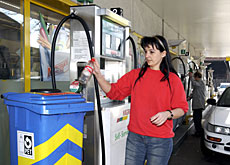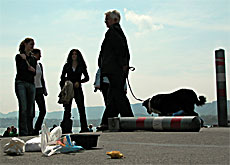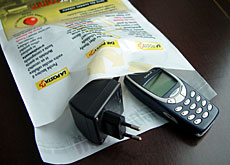Consumers told to recycle or pay the consequences

The company responsible for the collection of empty PET beverage bottles in Switzerland has issued a stiff warning to Swiss consumers.
If they don’t recycle more, they risk having to pay a compulsory deposit.
PET Recycling Switzerland has now started a nationwide campaign to encourage people to return more empties.
If this fails, a deposit on all PET bottles will be levied by the federal authorities, which are demanding higher rates of recycling.
Swiss law demands that three out of four PET (polyethylene terephthalate) bottles are collected and recycled – a quota that is unparalleled in Europe.
But last year the recycling rate dropped to 71 per cent, and PET Recycling Switzerland was 1,840 tons short of the target.
In round figures, the four per cent shortfall represents about 50 million bottles.
The warning might come as something of a surprise to the Swiss who pride themselves on being model recyclers.
Indeed, statistics show that Swiss households are leaders when it comes to disposing of large PET beverage bottles, with a recycling rate reaching an estimated 90 per cent.
Small bottle, big problem
But the trouble starts when it comes to the half litre and 0.33 litre sizes. Half of them land in the rubbish bin and are incinerated, or worse, end up littering the country.
PET Recycling Switzerland is now trying to make people aware of the problem with a clear message: “Every bottle counts!”
“We were forced to launch it because we really have a severe problem with the small PET bottles. Every second, a small bottle up to 0.5 litre doesn’t find its way into the recycling stream,” Jean-Claude Würmli, the company’s marketing manager, told swissinfo.
“The difficulty is that the consumer thinks the one PET bottle he is holding in his hand doesn’t really count. It’s a terrible mistake.”
“If every week, each Swiss threw only one PET bottle away, instead of bringing it back for recycling, it’s over 300,000,000 that are lost every year,” he added.
Serious threat
Würmli said people should not take the warning lightly, as the threat of a deposit was real.
“We believe it is quite serious,” he explained. “The Swiss environment agency has made this point very clearly.
“We believe they would introduce a mandatory deposit on PET bottles, hopefully only on the small ones. But it is possible that they may [do it] on all PET bottles.”
“That would be terrible because we should not forget that 90 per cent of the big PET bottles are collected and recycled,” he added.
If a bottle deposit were introduced, it would mean additional costs of around SFr120 million ($95.3 million) a year.
Consumer complaints
PET Recycling Switzerland, which charges the beverage industry four centimes a bottle to cover its SFr43 million annual costs, has been battling to address consumer complaints that there are not enough recycling bins.
There are currently around 21,000 collection points and 40,000 bins in the country.
“We are really working hard on it. It is the largest collecting system in the world per head of population, and it grows by 50 new collection points every week,” explained Würmli.
The company has set up 1,500 collection points this year alone, with priority given to petrol stations, Swiss kiosks (newsstands) and some retailers.
But Würmli admitted there would never be enough bins within easy reach of all consumers.
“We estimate we would need almost 300,000 collecting bins for the whole of Switzerland and this is something that just makes no sense,” he said.
Content problem
Another problem is the location of recycling bins: the further they are from public scrutiny, the worse the contents tend to be.
“Often you find diapers or even dead animals. Between ten and 20 per cent of what is in the recycling bin cannot be recycled,” said Würmli.
“This amounts to about 3,000 tons of waste that we have to take to the incinerator. We have to pay like any normal citizen – we have no special deal,” he added.
PET Recycling Switzerland says the 75 per cent minimum stipulated by law is attainable, but feels this is a harsh target when compared with the rest of the Europe.
“The minimum level in the European Union is 22.5 per cent, so in Switzerland we have to collect and recycle three times more,” said Würmli.
swissinfo, Robert Brookes in Zurich
There are about 1.2 billion PET bottles in circulation in Switzerland.
The recycling quota in 2002 was 72%. It fell to 71% last year.
The annual budget of PET Recycling is SFr43 million, which is raised by levying a four centimes tax per bottle on sellers and bottlers.
By year end, there will be 21,000 drop-off points in Switzerland.
PET Recycling Switzerland has launched a campaign to encourage consumers to recycle.
Federal authorities are threatening to put a deposit on the bottles if the company does not recycle three out of four PET bottles.
It is estimated that the introduction of a deposit would cause an additional SFr120 million in costs, which would inevitably be passed on to the consumer.

In compliance with the JTI standards
More: SWI swissinfo.ch certified by the Journalism Trust Initiative


You can find an overview of ongoing debates with our journalists here . Please join us!
If you want to start a conversation about a topic raised in this article or want to report factual errors, email us at english@swissinfo.ch.